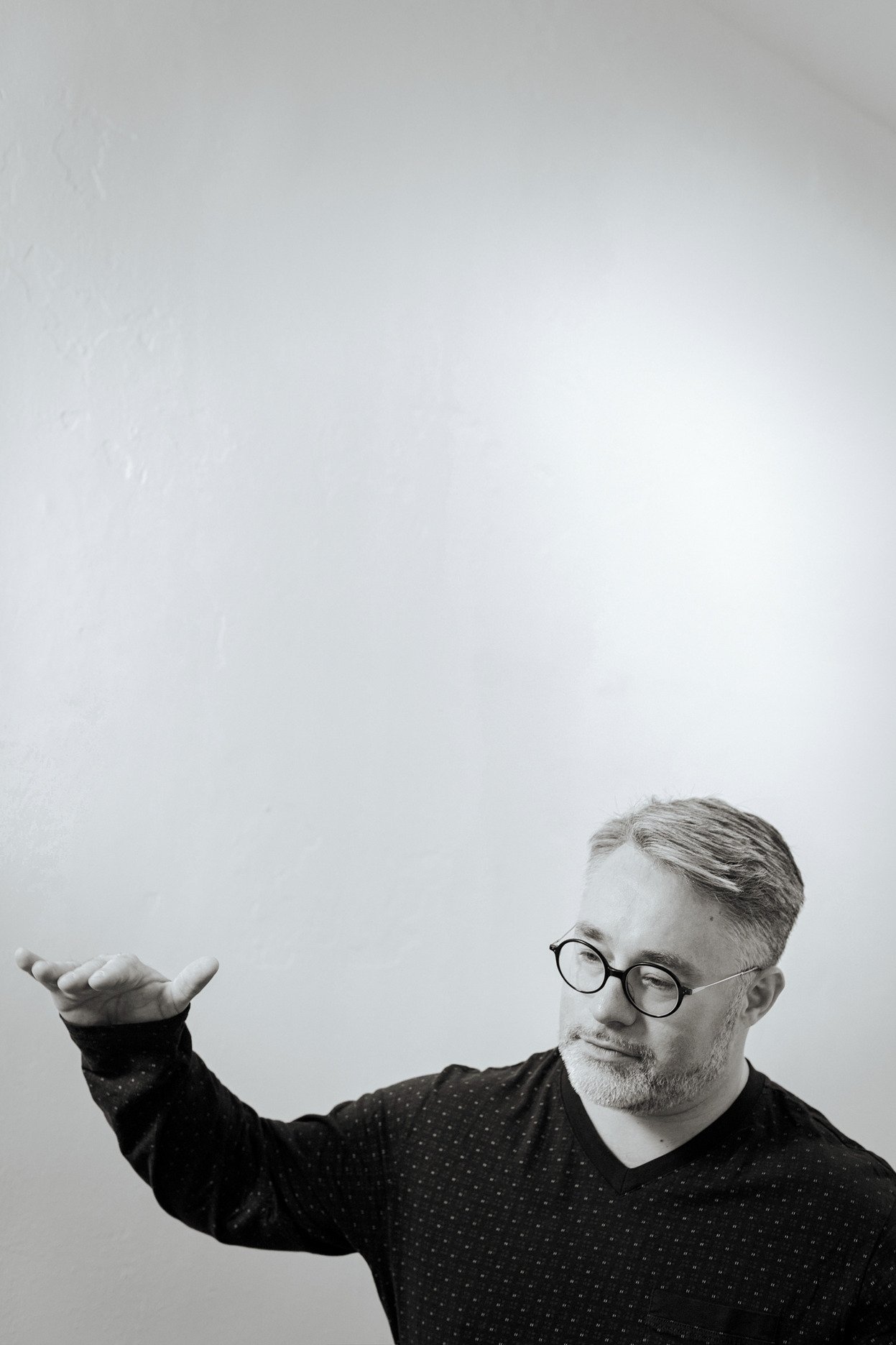Robag Wruhme ha rilasciato “Speicher 123”, un nuovo episodio della celeberrima serie di Kompakt Records. L’abbiamo incontrato per farci raccontare il percorso verso questa sua nuova release.
Ci sono figure quasi mitologiche nel mondo della musica elettronica. Tra questi c’è senz’altro Robag Wruhme, che oltre ad aver fatto la storia della musica elettronica in Germania, la storia e lo sviluppo di questo stile l’ha vissuto sulla propria pelle.
Sì, perché Gabor Schablitzki (vero nome del dj e produttore) ha vissuto il periodo a cavallo della riunificazione delle due Germanie. Proprio in quel momento, la voglia di ritornare ad una vita normale, in una nazione non più separata da chilometri di “muraglia”, rese possibile lo sviluppo di correnti artistiche e culturali uniche che hanno dato vita ad una sorta di rinascimento moderno.

Ripercorrendo le esperienze dei Sandor e dei Wighonomy Brothers, Robag ci fa capire un po’ di che pasta (musicale) è fatto. E ci presenta il contesto che gli ha permesso di affermarsi producendo musica per etichette di altre figure mitologiche della musica elettronica: Dj Koze per Pampa Records e Voigt, Mayer e Paape per Kompakt Records.
“Speicher 123” è stato rilasciato ufficialmente lo scorso 11 novembre per Kompakt Records e segna il ritorno del dj e produttore di Weimar con due tracce intense che rispecchiano tutta la sua esperienza: “Fire”, contraddistinta da una linea di bassi e sequenze che la rendono una traccia perfetta per il dancefloor e “Un-spok-en” che completa il disco con dei vocali quasi spettrali.
“Speicher 123” può essere acquistato tramite questo link ed è anche disponibile su Spotify.
Ciao Robag Wruhme, benvenuto su Parkett. Come stai?
Heeyyyy! (detta con grande energia, a conferma che tutto va alla grande, NdR)
Hai vissuto e sei cresciuto in Germania durante una fase molto importante della storia e della società moderna e dello sviluppo della musica elettronica. Come hai vissuto quest’ultimo aspetto in particolare a cavallo della riunificazione delle due Germanie? Qual è il ricordo più importante che hai di quel momento?
E’ stato un periodo molto eccitante dalle infinite contraddizioni. C’era solo un’etichetta discografica nella Repubblica Democratica Tedesca, si chiamava AMIGA la quale distribuiva i dischi dei Depeche Mode. Ma era veramente complicato riuscirli ad acquistare. Ad ogni modo, quando avevo 14 anni, il concerto che si tenne il 7 marzo 1988 nella Werner Seelenbinder Halle fu trasmesso per tre parti su quattro sulla radio DT64 durante le vacanze estive.
Il momento più eccitante di quel periodo è stato quando ero con degli amici nel momento dell’annuncio della caduta del muro e proprio uno dei miei amici ci raggiunse dandoci conferma che i confini stavano per essere riaperti. Corremmo tutti a casa perché eravamo increduli. A casa la TV era accesa e tutti la guardavamo attenti. Non ho mai sentito un silenzio tanto rumoroso.

Come sei entrato in contatto con il mondo della musica elettronica e techno?
È stato tutto così rapido. Dovevamo recuperare in qualche modo gli anni persi. È stato come stare sopra un razzo. Appena ho ascoltato un drum 4/4 e un hihat off-screen, quella è stata per me magia. E da allora non è cambiato nulla.
Parliamo un attimo dei Wighonomy Brothers. Com’è iniziato questo progetto con Soren Bodner?
Ci siamo conosciuti ai tempi della Repubblica Democratica facendo break dance, grazie al film “Beat Street” prodotto da Harry Belafonte. I leader della Repubblica non avevano molto chiaro il significato del film, al punto da renderlo obbligatorio nelle scuole. Non avevano proprio idea di quello che facevano.
Sei una figura di rilievo nel mondo della musica elettronica. Hai rilasciato tracce e dischi per etichette quali Pampa Records di Dj Koze, e Kompakt di Voigt, Mayer e Paape. Com’è stato lavorare con loro e qual è il tuo disco preferito per ognuna di queste etichette?
Mi piacciono tutti e io piaccio a loro…un pò. Non c’è un disco perfetto: c’è quello adatto ad un preciso momento e un altro no. Tutti i miei dischi sono perfetti e fanno schifo, dipende dal mood del momento.
Qual è stata la figura che ti ha maggiormente influenzato durante il tuo percorso artistico?
I Sandow! Gli sarò per sempre grato. Sia per il fischio nelle orecchie che mi hanno fatto venire al loro concerto quando avevo sedici anni, sia perché erano originari della Repubblica Democratica.
NdR: I Sandow sono una band fondata nel 1982 nella Repubblica Democratica, precisamente nell’area di Cottbus, che suonava punk rock per poi andare verso uno stile più avantgarde.
Il tuo suono è essenziale, minimal. Lo scorso 11 novembre hai appunto rilasciato su Kompakt, “Speicher 123”. Come vedi la tua evoluzione sonora da “Wuzzelbud KK” a “Thora Vukk” al tuo ultimo disco?
Il problema è che vorrei che si fosse riaccesa la vecchia luce ed ingenuità delle produzioni iniziali. Oggi ritengo di sapere troppo e questo mi fa prendere tutto e tutti troppo sul serio. Ed è un po’ noioso.
Qual è la strumentazione che utilizzi quando produci musica?
Uso un sacco di strumenti. Nel corso degli anni ho speso 500000 Marchi Tedeschi, Euro, Rubli, Dollari, Yen e Pesos per crearmi un parco giochi fatto di pulsanti, controlli, LED e cavi.
E chi è Robag Wruhme fuori dal mondo della musica?
Robag è una persona completamente diversa. Si chiama Gabor e si prende cura dei suoi figli.
Ci sono dei progetti futuri che vorresti condividere con noi?
Sto lavorando ad un nuovo album. Ma in questo momento non saprei dirti come e quando sarà pronto.
Grazie per essere stato in nostra compagnia ed a presto!
Grazie a voi!
ENGLISH VERSION
There are almost mythological figures in the world of electronic music.. Among these, there is Robag Wruhme, who in addition to having made the history of electronic music in Germany, he experienced the history and development of this style on his own skin.
Yes, because Gabor Schablitzki (real name of the DJ and producer) lived the period between the reunification of the two Germanys. Precisely at that moment, the desire to come back to a normal life in a nation no longer separated by kilometers of “wall”, causes the development of unique artistic and cultural currents that will give life to a sort of modern renaissance.
Retracing the experiences of Sandor and the Wighonomy Brothers, Robag makes us understand a little of what (musical) stuff he’s made of. And he presents us with the context that allowed him to establish himself by producing music for labels of other mythological figures of electronic music: Dj Koze for Pampa Records and Voigt, Mayer and Paape for Kompakt Records.
“Speicher 123” was officially released on November 11th on Kompakt Records. It marks the return of the Weimar origin producer with two intense tracks: “Fire” characterized by a bassline and sequences that make it the perfect dancefloor tune and “Un-spok-en” garnished by a haunting vocal snippet.
“Speicher 123” can be purchased via this link and it is also available on Spotify.
Hi Robag Wruhme, welcome to Parkett! How are you doing?
You lived and grew up in Germany during an important phase of the modern history, society and electronic music development. How did you live this aspect, in particular across the time of the reunification of the two ‘Germanies’? What are the most powerful memories of that time?
How did you approach the world of music and then the electronic and techno?
Talking about Wighnomy Brothers, how did this project with Soren Bodner started up?
You are a well-known figure in the electronic music scene, having released singles and albums for DJ Koze’s Pampa Records and Voigt, Mayer and Paape’s Kompakt. How is working with all of them and how is the record from each label that you think has been the best for you?

During your artistic journey, which has been the most influential figure to you?
Your sound is essential, minimal indeed. You have released the new “Speicher 123” on Kompakt Records the 11th of November. How do you see your artistic and sound evolution from “Wuzzelbud KK” to “Thora Vukk” to this new “Speicher 123”?

Cover Speicher 123
